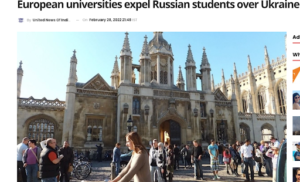- 2022/03/02
Disinformation: Why it is so dangerous and how we can defend against it

The ongoing armed aggression of the Russian military against Ukraine and its people is characterized by incredible brutality. Nevertheless, the attacks carried out by the Russian army are not limited to a militarized invasion of Ukrainian territory, but are also conducted on the “virtual front”. These attacks target Internet users and are designed to spread Russian propaganda. Though, it is worth finding out how each of us can verify the news appearing on social media.
Disinformation directly involves the dissemination of information that:
- is untrue and purposefully developed to influence the viewer’s decisions by generating specific misconceptions;
- is intended to create uncertainty or hostility, polarize or disrupt democratic processes
- is disseminated or amplified through automated and aggressive techniques (e.g., microtargeting, social bots, or use of artificial intelligence)
- can have the effect of paralyzing the decision-making process of the targeted institution/entity and discrediting it.
Disinformation very often uses:
- false interviews and manipulated quotes from key commanders, created on the basis of non-existent sources
- creation of false authorities and organizations commenting on particular events.
The means used are often tailored to the characteristics of the country, societies, and specific target groups in order to distort the truth, spread distrust, or create doubt among the audience.
Nowadays, readers’ awareness has increased to such an extent that some disinformation articles are rejected as unreliable at the very beginning due to some specific features of the material, among which we can mention:
- attributing unreliable words to people who would never say them in public (amorality, vulgarity, racism);
- unethicality and creating “artificial sensation”, exaggerating the situation;
- giving personal details of people in a situation, when normally they would not be made public;
- fabricating non-existent authorities (professors/experts whose scientific achievements cannot be found anywhere).
It is worth focusing on the 5 principles of reliable information checking and sharing, namely:
- Responsible choice: the ability to find, select and use a valuable source of information;
- Analysis and evaluation: ability to understand information, ability to identify its author, his views and purpose of publication, and then evaluate its quality and credibility
- Creation: the ability to interpret (non fake news) information using the potential of the media used;
- Reflection: ability to consciously manage one’s communication in an ethical and socially responsible manner;
- Action: the ability to take participatory action to defend one’s views and democratic values.
Disinformation in practice: Facts and myths about Russian military aggression in Ukraine
Myth #1: Dmitry Suslov, an international relations specialist from Russia’s Higher School of Economics in Moscow says that Russia does not want to inflict damage on the cities in Ukraine. However , it has no choice due to the fact that the Ukrainian army deployed missiles in the center of Kiev. He assumes that Ukrainians missiles destroy the city.
Source:Channel 4 News
Fact: The city’s mayor of Kharkiv, Ihor Terekhov said that on 1st March Russian missiles hit residential buildings, killing and injuring peaceful civilians. Kharkiv has not seen such damage for a very long time.
Myth #2: The Russian-speaking students are said to be expelled from European universities due to Russian aggression in Ukraine.
Source: Business Upturn
Fact: “Vilnius University condemns Russia’s military aggression in Ukraine but will never impose sanctions on the nationality of students or teachers. We are an open university that supports and nurtures democracy, where everyone who recognizes academic freedom of thought can find a place,” says the Rector of VU Prof. R. Petrauskas.
Myth #3: Ukrainian nationalists are responsible for the casualties by acting against the law.
Source: Daily Mail
Fact: Russian troops violated Ukraine’s sovereignty and attacked Ukrainian cities and civilians. In 2014, Russia occupied Ukrainian territory (Crimea) and actively supported separatists in the eastern part of Ukraine. It is currently conducting military operations throughout the entire country.
Prepared by Andrzej Piszczek, Agata Palinska and Marta Maciejewska
Sources:
„Z tarczą! Jak chronić się przed dezinformacją” – podręcznik do edukacji medialnej – Krajowa Rada Radiofonii i Telewizji – Portal Gov.pl (www.gov.pl)
News czy fake news. Jak działają organizacje fact-checkingowe? – Trójka – polskieradio.pl
Dezinformacja w internecie. Mamy się bać – GazetaPrawna.pl
platforma_przeciwdzialania_
Seven ways to protect yourself against misinformation | Knowledge Enterprise (asu.edu)
Fake News – and how to spot it – BBC News
Raport_CP_Dezinformacja_
https://www.washingtonpost.
https://twitter.com/






